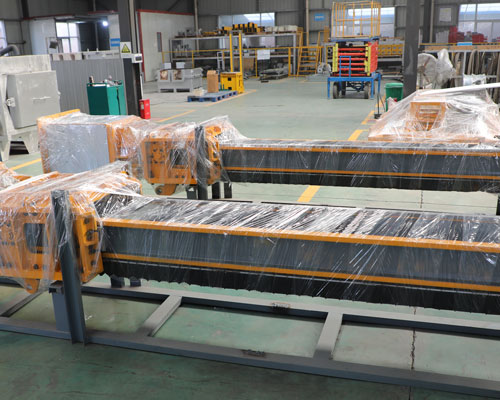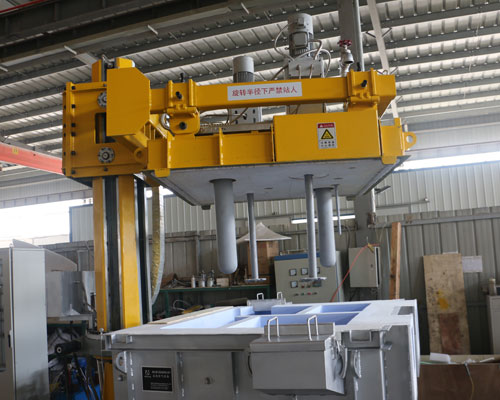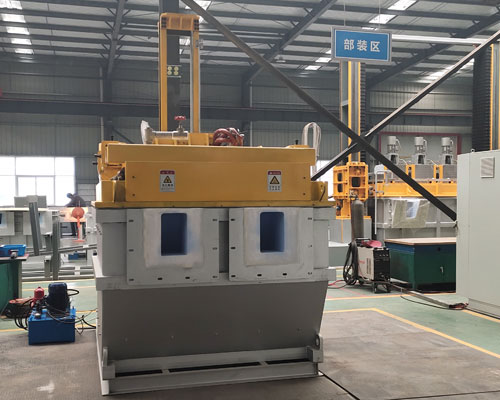The molten aluminum degassing box consists of two chambers, a clean room and a heating and holding chamber. The middle part is separated by a SiC separator. The bottoms of the two chambers are connected. After the aluminum alloy liquid is degassed and slag in the cleanroom, it flows into the heat preservation chamber from below the partition.
The greenhouse is made of U-shaped silicon carbon and the silicon carbide protection tube is immersed in the aluminum alloy liquid to heat it. The outer shell of the box is made of 10 mm steel plate, and the inner lining is made of refractory material, and the upper part of the side wall is provided with observation and inspection. The slag mouth is provided with a slag opening at the bottom.
The front and back of the molten aluminum degassing box are connected to a separate inner cavity. It is convenient for the heater to conduct directly, and the treated aluminum alloy liquid is transported by submerged flow.
In the lower part of the two side walls of the molten aluminum degassing box body, there is a slag cleaning door, the slag cleaning can be completed in the cavity without starting the degassing box cover, the service life of the box body cavity is prolonged, the heat preservation performance is also improved, the heat loss is reduced, and the heat is reduced. The thermal compensation can fully meet the temperature requirements of the production process.
The enclosure has good sealing performance, which can prevent air from entering the tank and avoid secondary pollution of the aluminum alloy liquid. It is equipped with a hydraulic tilting device, which can be completely discharged after the casting work is completed or when the alloy is replaced, and the inside of the box can be completely emptied completely. The heater does not have to be energized for a long time, and the power consumption can be relatively reduced.

Lifting system
In order to ensure its accurate positioning, two hydraulic cylinders are used as lifting devices to control the vertical up and down movement of the graphite rotor and the U-shaped silicon carbon rod heater heating system, and can be rotated in the horizontal direction of 90°. The hydraulic system is relatively stable. Positioning accuracy.
Heating system
The heating system uses an immersion heater, and the U-shaped silicon carbon rod is jacketed with a cylindrical silicon carbide or silicon nitride protection tube. There is a temperature measuring thermocouple in the tube, which can realize automatic temperature control and the power can be adjusted in the range of 2 kW to 26 kW.
The temperature control system adopts the advanced power integrated unit to realize the full-automatic control, avoiding the shortcomings of the buffering stage when the heater is turned on or off. The U-shaped silicon carbon rod heater is constantly subjected to the main current impact during frequent power-off and power-off. The unbuffered stage heater is easy to age and has a short life.

Graphite rotor
The graphite rotor rotating nozzle is made of high-purity graphite. The structure of the nozzle is not only considered to break up the air bubbles, but also the centrifugal force generated by stirring the aluminum alloy melt, so that the melt enters the nozzle and uniformly mixes with the horizontally ejected gas to form gas. / The liquid stream is sprayed to increase the contact area and contact time of the bubble with the aluminum alloy liquid, thereby improving the degassing purification effect.
The speed of the graphite rotor can be controlled by the frequency converter, which can be as high as 400 r/min. The graphite rotor has a specification of Φ150 mm~250 mm and an impeller specification of Φ250 mm~350 mm. The high-purity anti-oxidation graphite rotor has the characteristics of high strength, high temperature resistance, and aluminum flow corrosion resistance.
During the process of purifying and degassing, the surface of the aluminum alloy liquid in the box is protected by nitrogen gas, so that the part of the graphite rotor exposed to the aluminum alloy liquid is in an inert gas, preventing the high temperature oxidation of the rotor and prolonging the service life of the rotor; the shape of the impeller is streamlined, The frictional resistance during rotation is reduced, and the frictional scouring force generated between the impeller and the aluminum alloy liquid is relatively small.

